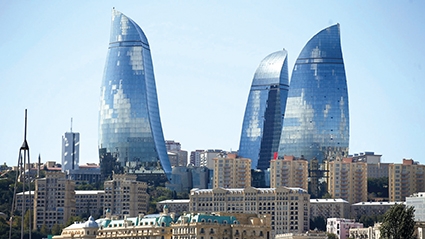The Geopolitics of Azerbaijan
The South Caucasus energy corridor is an important component of Europe’s energy efficiency. True, that the continent needs more than what the corridor can offer, but its operation could nevertheless, albeit slightly, shift Europe’s dependence on Russian gas.
Georgia plays a crucial role as a vital transit route. However, it is sometimes forgotten that the source of all energy riches comes from Azerbaijan and that it is not so much Tbilisi, but Baku that actually plays a focal point in the geopolitical calculations of the large neighboring states. Azerbaijan’s geographic position is unique as it occupies the land which for the moment serves as the shortest and the only (except for the long one through Central Asia) land route through which Russia is connected to Iran. The existence of large oil and gas deposits see both Teheran and Moscow vie for a bigger influence over Azerbaijan.
To influence Azerbaijan geopolitically means controlling the beginning of the South Caucasus Energy Corridor. Furthermore, Azerbaijan’s position will be further strengthened as the resolution of the Caspian Sea bed division nears completion. Technically, this would enable the littoral states to build various pipelines. One of such projects is the Trans-Caspian Pipeline (TCP), which, if implemented, would go through Azerbaijan, Georgia and on to Europe.
Russia in the north, Iran to the south – this geographic constantly drives the creation of Azerbaijan’s foreign policy. The ideal scenario for Baku would be to play the northern neighbor against the southern one. The problem with this policy, though, is that Teheran and Moscow’s policies do actually coincide in many ways.
True, the two have historically been geopolitical enemies trying to solidify their respective influence in the South Caucasus. However, since the break-up of the Soviet Union in 1991, Russia and Iran’s aims have opposed the advance of western economic as well as military influence in the region overall and specifically in Azerbaijan. Iran does not want to see Azerbaijani land being used by foreign powers, whether it is Israel or NATO member states. Similar worries are reflected in Russia’s foreign policy moves. Moreover, Iran and Russia also share the view that the TCP would harm their respective interests, as both aim at the European gas and oil market and do not want Turkmen gas to reach Europe. There is also another important aspect which constrains Baku’s foreign policy – the Nagorno-Karabakh issue. It has been common throughout the last several decades to relate the reasons behind the Karabakh war between Armenia and Azerbaijan to that on the ground, with the military situation being unstable and can easily spill over into an open confrontation, as it happened in April 2016.
What is missing though is a bird’s eye view on the Karabakh problem: the conflict prevents Azerbaijan from being less hesitant towards foreign policy moves and, by extension, increases Russian influence over the country as Armenia, Azerbaijan’s arch-enemy, is Moscow’s close ally. From a geopolitical point of view, Azerbaijan, although the country enjoys commerce and other contacts with Russia and Iran, is nevertheless in a restricted neighborhood, where the only exit to the west is through Georgia.
Thus, from a broader perspective, Azerbaijan’s position of being sandwiched between three geopolitically covertly or overtly antagonistic countries (Russia, Iran and Armenia), forces Baku to find a geopolitical counterweight. Georgia, however, cannot act as such in military or economic terms. Alas comes Azerbaijan’s pivot to the West, more specifically, to Turkey, but again largely through Georgian territory.
Turkish-Azerbaijani relations boom. Ankara understands that losing Azerbaijan to Russian or Iranian influence would be tantamount to the closure of Southern Caucasus energy corridor, or to the limitation of Turkish influence in the Caspian region. This logic also underpins the increasing collaboration between Turkey, Georgia and Azerbaijan in both the military and economic realms.
Azerbaijan’s foreign policy is based on the country’s geographic position. A position which is both beneficial to enjoy economic benefits as a source of energy riches and as a starting point of the Southern Caucasus energy corridor, and inconvenient as Russia and Iran have their own geopolitical agendas on how to constrain the government in Baku. Thus, Azerbaijan’s foreign policy is rooted in these geographic constraints which are further worsened by the lingering Nagorno-Karabakh issue.
By Emil Avdaliani












